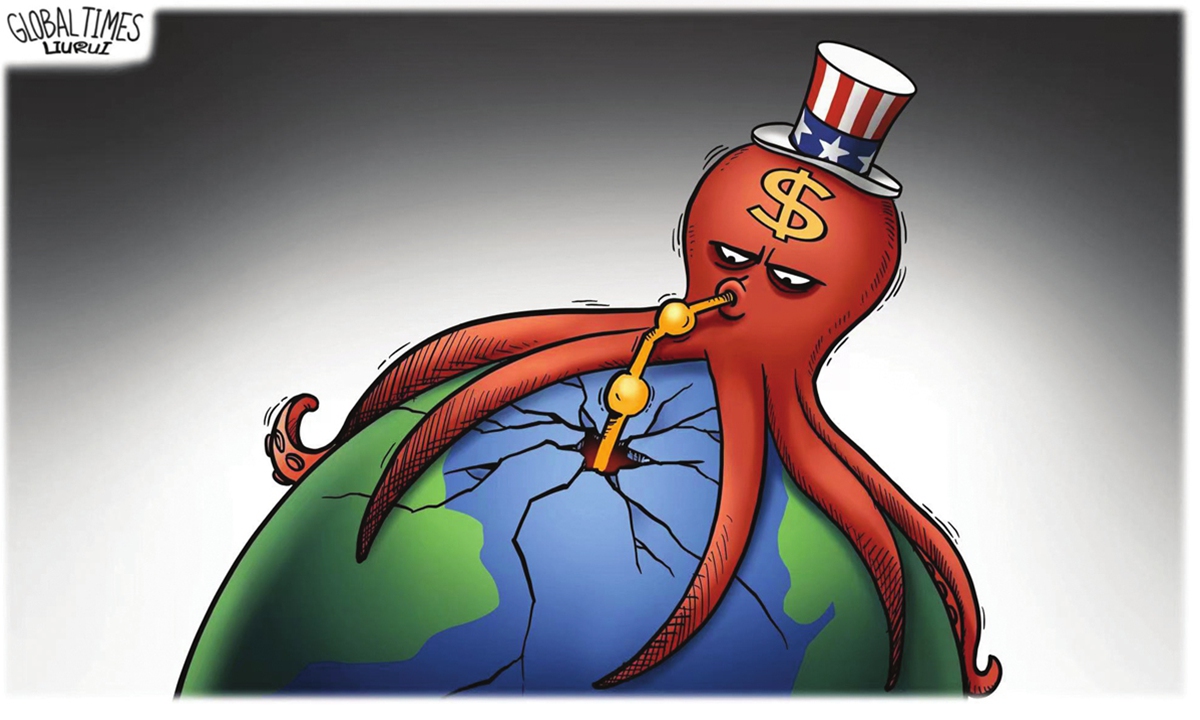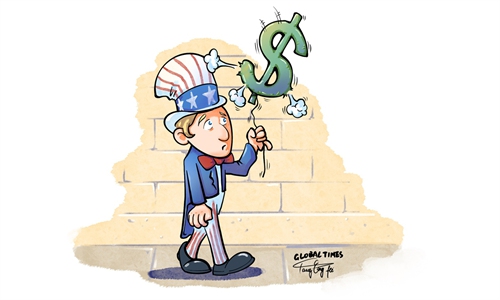
Illustration: Liu Rui/GT
Not long ago, US Vice President Kamala Harris visited three African countries - Ghana, Tanzania, and Zambia. This is the fifth visit by a high-ranking Biden administration official to Africa this year. During her visit, Harris repeatedly raised the issue of African debt, urging China to reduce debt owed by Ghana and Zambia, and announced the dispatching of a full-time resident advisor in 2023, to Accra to assist the US Ministry of Finance with debt restructuring issues from 2023 onwards.While the US is pointing its finger to African debt issue, its own domestic economy is on the verge of trouble. Washington's monetary policy has shifted from extreme easing, to radical interest rate hikes, triggering multiple US banks to collapse as well as subsequent negative chain reaction around the world. How can the US, whose financial policy is so irresponsible and self-serving, be so emboldened to lecture African countries how to deal with debt problems? It is time for the US to take a look in the mirror and examine its role in African debt issues.
The US' irresponsible monetary policy is the root of African debt problems. Relying on dollar hegemony, the US has implemented three rounds of quantitative easing, cut interest rates to near zero, and flooded Africa and emerging markets with low-interest dollars. It then arbitrarily and aggressively raised interest rates, boosted the US dollar exchange rate, attracted the return of dollars, as a result, African countries have to face liquidity shortages, broken funding chains, currency depreciation, skyrocketing debt repayment costs denominated in dollars, a surge in sovereign debt, and exacerbated debt problems.
The unfair financial system led by the US is the root of Africa's debt problems. The current global financial governance system is built on the dominance of the US dollar, with the International Monetary Fund (IMF) and World Bank as the main pillars. Under this system, African countries are considered "second-class citizens" in several aspects.
First, their share and representation are low in monetary and financial institutions. Under the IMF's weighted voting system, the US holds a 16.5 percent share of votes and has veto power over major issues, while African countries such as Zambia and Ghana only have little share.
Second, the cost of financing is high. The three major institutions of Standard & Poor's, Fitch, and Moody's monopolize global sovereign credit ratings, giving preferential treatment to Western countries. The public debt-to-GDP ratio of the US stood at 134 percent, 266 percent for Japan, and 103 percent for the UK, far exceeding the safety line, but they have long been given high credit ratings, which enables them to borrow at very low costs. However, once African countries face liquidity difficulties, their credit ratings are rapidly downgraded, and their borrowing costs increase significantly.
Third, their risk-resistance mechanisms are weak. By virtue of its financial advantage, the US shifts risk to the international community by manipulating the money supply and interest rates. African countries can only passively "take over," allowing US and Western capital to enter and exit freely, ultimately leading to the breakdown of the capital chain, currency devaluation, and a sharp rise in debt servicing costs. In addition, as the largest shareholder of the World Bank and IMF, the US has not fully fulfilled its responsibilities as a major power, failing to encourage the relevant institutions to actively participate in resolving Africa's debt problems and propose effective solutions.
The US policy of lending to Africa is a vicious cycle of debt traps. When dealing with African debt problems, the US attaches a large number of political conditions, sets many standards and thresholds that many African countries find difficult to achieve, and attempts to "reform" Africa through debt issues as leverage. Moreover, the loans that the US gives to Africa are mainly used in non-production areas, triggering African governments to fall into a vicious cycle - borrowing more and getting poorer, and getting poorer and borrowing more.
When these facts and truths are understood, the US' intention to shift the focus of contradiction, undermine China's image, and sow discord between China and Africa by hyping up the narratives such as "China debt trap" is abundantly obvious.
In fact, China has made concrete contributions to help African countries deal with debt problems. The Eighth Ministerial Conference of the Forum on China-Africa Cooperation (FOCAC) in 2022 unveiled that China will take out $10 billion of its Special Drawing Rights to Africa, and has made phased progress. China signed agreements or reached consensuses with 19 African countries on debt relief and suspended the most debt service payments among G20 members.
The essence of the debt problem is a development problem. China is the country that has made the most contributions to Africa's development. According to statistics, since the establishment of the FOCAC in 2000, Chinese companies have built and upgraded over 10,000 kilometers long railways, nearly 100,000 kilometers of highways, about 1,000 bridges, nearly 100 ports in Africa, as well as a large number of hospitals and schools, and created more than 4.5 million jobs for Africa.
When Harris arrived in Africa, she might not be aware that she may be in an airport built by a Chinese company, and her convoy might be traveling on roads or bridges built by Chinese firms. In African countries, infrastructure built by Chinese companies can be seen everywhere. China has made concrete contributions to Africa's development with high-quality and efficient practical actions, which is the responsibility and duty that a great power should have.
The author is an observer on international affairs. opinion@globaltimes.com.cn


